December 11, 2019
[Senegal] Center for stability and development in West Africa
Senegal is located on the westernmost tip of Africa. In a Japan-centered world map, Sen-egal appears to be at the farthest left-hand side of the earth, but on an Atlantic-centered world map, the country is located in the middle, at the crossroads of the Atlantic between Europe, the Americas, and Africa. Senegal's capital city Dakar, which came to be widely known as the goal of the Paris-Dakar Rally, sits on the tip of Cape Verde Peninsula that stretches out into the Atlantic Ocean. The city was developed as a gateway port of the country and continues to serve as an economic and business hub of West Africa.
Since its independence from France in 1960, Senegal has not experienced a single incident of coup d'etat or civil war and has maintained political and economic stability. On the other hand, Senegal is currently categorized as a low-income country, and still faces challenges in many aspects including unstable food supply, rapid population growth and urbanization.
JICA's Senegal Office in Dakar oversees seven West African countries. It is making an ef-fort to contribute to the stability and development of Senegal and the surrounding region.
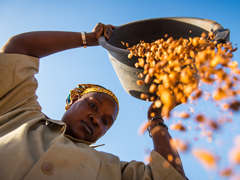
A woman pouring roasted peanuts into a crusher. Peanut is an important cash crop in Senegal.
Assisting rice farming and strengthening capital functions
Under the national economic development strategy "Plan for an Emerging Senegal (PES)," the government of Senegal aspires to turn the country into an emerging nation by 2035. To achieve the goal, the government has prioritized development of economic infrastructure in the cities and development of the primary industry that accounts for 70% of employment in the population.
While Senegal is one of the major rice consumers in West Africa, its self-sufficiency rate of rice is low and the country is heavily dependent on imports for rice and other staple foods. The government of Senegal aims to achieve 100% self-sufficiency for rice. However, with the population growing and income levels increasing, demand for rice is also increasing, making the goal still unrealized. To increase rice production, JICA is providing technical cooperation in irrigated rice farming in the Senegal River Valley, an ideal place for rice production situated in the northern part of the country.
In addition, JICA is providing support in building electricity, water and other infrastructure in the metropolitan area of Dakar, where living conditions are deteriorating due to rapid urban-ization. The organization is also behind the wharf repair of Dakar port to enhance connectivity of logistics.
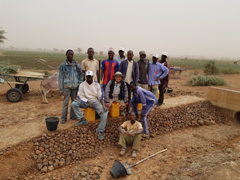
Farmers joined to repair the water course of the JICA-supported irrigated rice field.
To achieve 100% self-sufficiency of rice
Rice production is expanding in Africa today. At the 2008 Tokyo International Conference on African Development (TICAD IV), Japan launched the Coalition for African Rice Development (CARD) initiative, and the African rice production doubled in 10 years between 2008 and 2018. CARD phase 2 is currently underway to further double rice production in the next decade.
JICA saw early on the potential for rice production in the Senegal River Valley and has provided technical assistance and irrigation development since the 1980s. This area would be the key to achieving the Senegalese government's target for 100% self-sufficiency in rice production.
The government of Senegal highly valued JICA's rice production masterplan and adopted it as part of the nation's agricultural program. Following this, JICA is now preparing a subsequent ODA loan project. Based on years of trust and partnership with local stakeholders, JICA has been meticulously providing agricultural assistance in Senegal, including maintenance of irrigation facility, production technique training, agricultural mechanization, and introduction of double cropping.
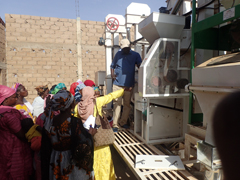
Rice milling machine operation training for a group of women as part of JICA's technical assistance.
Expanding production of tomatoes and rice
Noticing that tomato is a key ingredient in West African cuisine, Japanese food manufacturer Kagome Co., Ltd. started a feasibility survey on tomato production and processing in Senegal through JICA's Public-Private Partnership program.
The feasibility survey led to Kagome's setting up of a subsidiary in Senegal at the end of 2017, launching a large-scale farm of tomatoes for processing use. In spite of problems such as farmers' lack of experience, soil quality, and logistics for equipment and materials, Kagome's tomato enterprise in Senegal is expected to be the company's strategic base in West Africa where the demand for tomatoes is rising.
Since the beginning of the feasibility survey, Kagome staff had noted the possibility of growing rice after harvesting tomatoes in a double-cropping system. Growing rice on well-maintained and fertile land will also contribute to the nation's goal in increasing domestic rice production. The Kagome farms are located near JICA's Senegal River Valley irrigation project site and the two parties are actively exchanging information on agriculture in the area. JICA and Kagome working together in agriculture in Senegal -- it is a good example of Japan's private-public sector partnership.
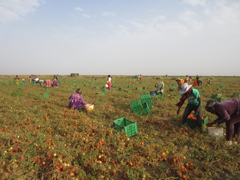
Harvesting tomatoes for processing use at the Kagome tomato farm
Photo:Kagome Senegal Sarl
Infrastructure development in Dakar metropolitan area
As of 2017, the population of Dakar metropolitan area is estimated at 3.63 million and it is expected to grow to 5 million by 2025. Due to the rapid population growth, the urban areas in Dakar have expanded without city planning and infrastructure development. The lack of proper infrastructure is causing problems such as flooding and unstable energy supply, affecting citizens' lives and obstructing economic development.
In February 2018, JICA signed a grant agreement for urgent rehabilitation and strengthening of energy distribution network in Dakar Region, to provide a stable energy supply in the city of Dakar, especially its new developing areas, and the surrounding cities.
JICA is also carrying out desalination facility construction and water distribution network renovation projects to deliver safe water to the Dakar metropolitan area. Senegal's first desalination facility is attracting a lot of attention.
At Dakar Port, a groundbreaking ceremony of the third wharf rehabilitation was held this July. The project is being carried out by JICA's grant aid. Dakar Port has nine wharves and the third wharf handles freight within Senegal and to Mali. The rehabilitation is expected to help improve logistics and connectivity.
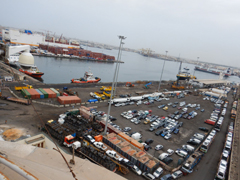
The third wharf of Dakar Port, where rehabilitation is taking place




scroll